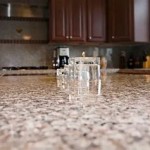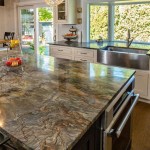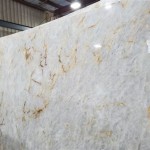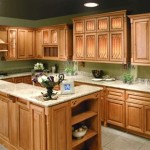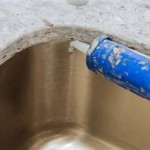What Is Artificial Stone Countertop?
Artificial stone countertops, also known as engineered stone countertops, represent a significant advancement in surface material technology. They are composite materials primarily composed of crushed stone bonded together by an adhesive, most commonly a polymer resin. This manufacturing process allows for a high degree of control over the material's properties, leading to countertops that offer a blend of durability, aesthetic versatility, and relatively low maintenance compared to natural stone alternatives like granite or marble.
The composition of artificial stone countertops varies depending on the manufacturer and desired aesthetic. However, the basic formula usually involves a high percentage of natural stone aggregates, ranging from 90% to 95%, mixed with a smaller percentage of resin, pigments, and sometimes additives to enhance specific characteristics such as UV resistance or antimicrobial properties. This combination results in a non-porous surface that is highly resistant to staining and scratching.
The term "artificial stone" encompasses a broad range of products, and it's important to differentiate between the various types. While some materials, such as solid surface countertops, share similarities in appearance and manufacturing techniques, they differ substantially in their composition. Solid surface is primarily made of acrylic or polyester resins with mineral fillers, whereas artificial stone relies predominantly on natural stone particles. This distinction affects the material's performance, appearance, and price point.
One of the key benefits of artificial stone countertops is their consistency. Natural stone can exhibit significant variations in color, pattern, and veining, making it challenging to achieve a uniform look across a large surface. Artificial stone, on the other hand, is manufactured with controlled mixing processes that ensure uniformity, minimizing the chances of unwanted inconsistencies. This predictability is especially valuable for large-scale projects or when a specific aesthetic is desired.
Furthermore, the manufacturing process allows for the incorporation of various pigments and additives, expanding the range of available colors and patterns. Artificial stone countertops can mimic the look of natural stone, including granite, marble, and even concrete, but with greater design flexibility. Manufacturers can also create unique aesthetics that are not found in nature, providing homeowners and designers with a wide array of options to suit their individual preferences and project requirements.
The fabrication of artificial stone countertops involves cutting, shaping, and polishing the material to the desired dimensions and edge profiles. Specialized tools and techniques are employed to ensure precise cuts and smooth finishes. Installation is typically performed by experienced professionals who can properly support the countertop and seal the seams to prevent water damage. While artificial stone is generally durable, proper installation is crucial to ensure its long-term performance.
Durability and Maintenance
Artificial stone countertops are renowned for their durability and resistance to common household hazards. The high density of the material and the bonding strength of the resin make it less susceptible to chipping, cracking, and staining compared to many other countertop options. This resistance to staining is a particularly significant advantage, as spills can be easily wiped away without leaving permanent marks. Common culprits like coffee, wine, and juice are less likely to penetrate the non-porous surface, simplifying cleanup and preserving the countertop's appearance.
The resistance to scratching is another important characteristic of artificial stone countertops. While no surface is entirely scratch-proof, the high percentage of quartz or other hard minerals in the composite makes it significantly more resistant to abrasion than softer materials like acrylic or wood. However, it is still advisable to use cutting boards to avoid potential scratches from knives and other sharp objects.
Despite their durability, artificial stone countertops are not indestructible. Excessive heat can damage the resin binder, potentially leading to discoloration or cracking. Therefore, it is recommended to use hot pads or trivets under hot pots and pans. Similarly, harsh chemicals and abrasive cleaners can dull the surface finish over time. Gentle, pH-neutral cleaners are generally recommended for daily cleaning. Wiping up spills promptly is also advisable, even though the material is stain-resistant, as prolonged exposure to certain substances could potentially cause discoloration in the long run.
Maintaining artificial stone countertops is relatively straightforward. Regular cleaning with a soft cloth and mild detergent is usually sufficient to keep the surface looking its best. For stubborn stains, a non-abrasive cleaner designed for use on engineered stone can be used. It is important to avoid using scouring pads or abrasive cleaners, as these can scratch the surface. Sealing is generally not required for artificial stone countertops, as the non-porous nature of the material prevents liquids from penetrating. However, some manufacturers may recommend periodic sealing to enhance stain resistance and improve the overall appearance. The longevity of artificial stone countertops is a major selling point. With proper care and maintenance, they can last for many years, retaining their beauty and functionality.
Aesthetics and Design Versatility
The aesthetic versatility of artificial stone countertops is a significant factor in their popularity. The manufacturing process allows for a wide range of colors, patterns, and textures to be incorporated into the material. This design flexibility enables homeowners and designers to create countertops that complement a variety of architectural styles and interior design schemes.
Artificial stone countertops can be manufactured to mimic the look of natural stone, such as granite, marble, and limestone. This allows for achieving the desired aesthetic of natural stone without the associated drawbacks, such as inconsistent patterns or the need for regular sealing. Manufacturers can replicate the veining, coloration, and texture of natural stone with remarkable accuracy, providing a convincing alternative that is often more affordable and easier to maintain.
Beyond mimicking natural stone, artificial stone countertops can also be created in unique designs that are not found in nature. This opens up a world of possibilities for creative expression and customization. Bold colors, intricate patterns, and even embedded materials can be incorporated into the countertop, allowing for a truly personalized design. The ability to create custom colors and designs is particularly attractive to homeowners who are looking for a unique and distinctive look for their kitchens or bathrooms.
The edges of artificial stone countertops can also be customized to create different aesthetic effects. Common edge profiles include bullnose, ogee, and eased edges. These profiles can be chosen to complement the overall style of the kitchen or bathroom and to enhance the countertop's visual appeal. The ability to customize the edges adds another layer of design flexibility and allows for creating a truly unique and personalized countertop.
Furthermore, artificial stone countertops can be used in a variety of applications beyond kitchen and bathroom countertops. They can also be used for backsplashes, wall cladding, and even furniture surfaces. The versatility of the material makes it a popular choice for both residential and commercial projects.
Cost and Environmental Considerations
The cost of artificial stone countertops varies depending on several factors, including the brand, color, pattern, thickness, and edge profile. Generally, artificial stone countertops are less expensive than high-end natural stone options like rare types of granite or marble. However, they may be more expensive than lower-grade natural stone or laminate countertops. The overall cost also includes the cost of fabrication and installation, which can vary depending on the complexity of the project and the experience of the installer.
When evaluating the cost of artificial stone countertops, it is important to consider the long-term value. The durability and low maintenance requirements of the material can result in significant cost savings over time. Unlike natural stone, artificial stone does not require regular sealing, and it is less susceptible to staining and damage. This can reduce the need for repairs or replacements, making it a cost-effective option in the long run.
From an environmental perspective, artificial stone countertops offer both advantages and disadvantages. The use of recycled materials in some artificial stone products can reduce the environmental impact of the manufacturing process. Additionally, the durability and longevity of artificial stone countertops can reduce the need for frequent replacements, which can conserve resources and reduce waste. The manufacturing process can also be less energy-intensive than quarrying natural stone.
However, the production of artificial stone countertops can also have environmental impacts. The resin used in the bonding process is often derived from petroleum, a non-renewable resource. Additionally, the manufacturing process can generate air and water pollution. It is important to choose artificial stone products from manufacturers that are committed to sustainable practices and that minimize their environmental impact. Some manufacturers are now using bio-based resins or recycled materials to further reduce their environmental footprint.
The disposal of artificial stone countertops can also be an environmental concern. The material is not biodegradable and can be difficult to recycle. However, some companies are exploring methods for recycling artificial stone countertops, such as using them as aggregate in concrete or asphalt. Choosing a durable and long-lasting countertop can minimize the need for disposal and reduce the overall environmental impact. Consideration of the entire lifecycle of the product, from manufacturing to disposal, is essential for making informed purchasing decisions.

Artificial Stone Countertops Better Than Natural

What Are The Benefits Of Engineered Stone Countertops Marble Com

The Difference Between Granite And Man Made Stone Bc

Study Find Health Risks Associated With Artificial Stone Countertops Latest Hum News

High Quality Artificial Stone Countertop Acrylic Kitchen Made In China Com

The Characteristics And Of Artificial Stone Knowledge Xiamen Hongzhanxing Co Ltd

Artificial Quartz Stone Countertops Supplier And In China Est

Artificial Stone Type Engineered Quartz Countertop From China Stonecontact Com

Artificial Stone Countertops

Popular Quartz Stone Countertop Super White Artificial For Project Hotel Table Top Slabs Made In China Com
See Also

